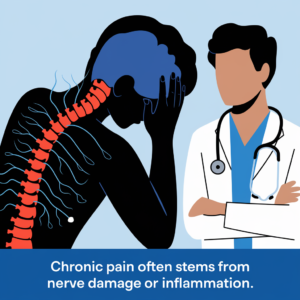
Why does my back hurt when I lay down flat?
If you’ve ever laid down at night hoping to finally relax—only for your back to scream in protest—you’re not alone. I’ve dealt with this for years. Back pain when lying flat isn’t just frustrating… it’s exhausting. And for me, it didn’t matter how tired I was—laying flat made my lower back ache even more than standing or walking.
I used to think maybe it was just my mattress, or that I had a weird sleeping position. But eventually, I realized this wasn’t normal. This was lower back pain while sleeping that kept showing up, night after night. It turns out, there are several reasons why back pain gets worse when lying flat:
- Your spine isn’t aligned properly without support
- Pressure builds on inflamed joints or discs when muscles relax
- Nerves that are already irritated can get pinched in certain positions
After talking with a specialist and doing some imaging, I learned I likely had a combination of degenerative changes and muscle instability causing the pain. And I wasn’t imagining it—laying flat really does increase pressure on the spine in certain spots, especially the lower back.
One simple thing that made a big difference? Adding a lumbar support pillow at night. I started using this lower back pillow made for sleeping, and the first night I used it, I felt the difference. It’s made of memory foam and fits right at my waist while I lay on my back. That tiny change helped support the natural curve in my spine and eased some of that deep ache I thought I’d just have to live with forever.
If your pain feels more complex—like it’s part of a bigger spinal issue—you might want to learn more about the different types of spondylolisthesis. This breakdown on the 5 types of spondylolisthesis helped me finally understand why my back pain showed up most aggressively when I was just trying to rest.

Is lower back pain while sleeping something to worry about?
At first, I thought I was just being dramatic. Everyone gets sore sometimes, right? But over time, the pain in my lower back when lying down got worse, and it started creeping into my daily life. I’d toss and turn all night, wake up already exhausted, and drag that pain around all day like a backpack full of bricks.
Turns out, lower back pain while sleeping can be more than just a comfort issue—it can be a warning sign.
Here’s what my own journey taught me:
- If you feel sharp pain when lying flat, especially if it radiates down a leg, it could be nerve-related.
- If the pain eases when you get up and move, that’s a big clue the issue involves inflammation, posture, or disc pressure.
- If you notice weakness (like I do with my left leg), it may be tied to more serious spinal issues like nerve compression or spinal instability.
I eventually got tired of guessing and got some proper testing done. If your pain is persistent, interfering with sleep, or causing numbness or weakness, it’s time to take it seriously.
There’s a solid read on C5 to C6 nerve compression that explains how pain and nerve symptoms don’t always show up just in the neck. For me, everything from my lower back to my left shoulder felt connected, and knowing that helped me finally start asking the right questions.
If you’re where I was—dealing with back pain at night and wondering if you’re just being “soft”—you’re not. Something’s going on. And you deserve real answers.

What are the most common causes of nighttime back pain?
If you’re like me, the pain doesn’t start when you’re lifting something heavy or doing yard work—it kicks in when you’re trying to rest. Lower back pain when sleeping felt backward to me at first. I mean, shouldn’t lying down take the pressure off your back?
Turns out, there are quite a few reasons this happens—some more serious than others.
- Poor spinal alignment – When you lie flat, your spine might not be properly supported, especially if your mattress is too soft or too firm.
- Disc issues – Herniated or bulging discs often flare up when you’re horizontal, especially if there’s pressure on the nerve root.
- Muscle tension – If your back muscles are tight from stress or posture, they don’t just shut off at night—they pull and ache even more.
- Degenerative changes – Conditions like arthritis or facet joint syndrome can worsen in stillness, especially if inflammation is already there.
- Chronic issues – Like in my case, nerve irritation and structural instability were major players.
And let’s not forget stress. Mental tension builds up physically, and when I was anxious or dealing with depression, the pain honestly felt worse at night. Your body doesn’t get to reset when your mind is running.
I found a solid breakdown of the root causes of chronic pain that helped me figure out what pain might be mechanical and what could be inflammatory or neurological. It’s worth digging into—especially if your nights are becoming battlegrounds like mine were.

Why is back pain worse when I lay down?
This was probably the most frustrating part for me—why is back pain worse lying down, when it should be the time my spine gets a break?
Here’s what I found out after lots of trial, error, and doctor visits:
- Gravity shifts – When you lie down, gravity stops pulling your spine vertically, which changes how discs and joints interact. That shift can cause pressure where there wasn’t any while standing.
- Lack of support – If the curve of your lower back isn’t supported (like mine wasn’t), your spine sags slightly, straining muscles and joints.
- Muscle relaxation – Believe it or not, when back muscles relax, underlying instability can become more noticeable—especially if your spine has been compensating all day long.
This explained so much of what I was feeling. And once I tried elevating my knees with a lower back wedge pillow like this one (memory foam lumbar support for sleeping), things shifted. That one small adjustment lifted pressure off my lumbar spine just enough to give me a break from the deep ache I’d grown used to.
I also learned that posture doesn’t just matter when we’re sitting—it matters when we’re unconscious too. I used to sleep like a board thinking that was “good posture,” but now I know my body needs intentional support.
If you’re dealing with that same frustrating cycle of pain flaring up at night and relief only coming when you’re upright, you’re not crazy. You’re just like me—and there are steps you can take to start feeling human again.

What’s the link between anxiety and nighttime back pain?
This part hit me hard, because for the longest time, I thought I was just spiraling. The worse my back pain while lying down got, the more anxious I became about going to bed. And of course, the more anxious I got, the more my body tensed up—and the cycle just kept feeding itself.
I’ve dealt with anxiety and depression for years, and when you’re also fighting chronic pain, it’s like both conditions make each other worse. My muscles stayed clenched even when I was supposed to be relaxing. And I’d lie there wondering if the pain would ever stop—or if I’d ever get a full night of sleep again.
What I didn’t know at the time was how deeply mental health and chronic pain are connected. Anxiety can literally cause physical symptoms like muscle tension, nerve sensitivity, and sleep disturbances. And when pain wakes you up night after night, it messes with your head.
I finally found something that helped me not just physically, but emotionally too: natural cures for depression that support overall healing. That read gave me permission to stop trying to “push through it” and actually start listening to my body—and mind.
If you’re lying there feeling anxious about the pain—and anxious about not sleeping—you’re not alone. You’re just dealing with a very real, very misunderstood cycle.

Is your mattress making your back pain worse?
For the longest time, I blamed my back pain on myself—bad posture, old injuries, even my anxiety. But one night at a hotel, I realized something: I actually slept better on that mattress than I did at home. That was my lightbulb moment.
Most of us never think twice about our bed. But if you have lower back pain while sleeping, your mattress could be the silent culprit. If it’s too soft, your hips sink and throw your spine out of alignment. If it’s too firm, your lower back might not get enough support and hover in an awkward arch.
For me, switching to a firmer memory foam mattress and using a lumbar support pillow made a massive difference. This wedge-style lumbar pillow for sleeping supports the natural curve of my spine and keeps pressure off the sorest part of my back—especially when I sleep on my back.
If you’re not sure where to start, don’t go mattress shopping blind. First, check how you feel when you sleep in different places. That alone can reveal if your bed is making things worse. Then, start small—like with a support pillow—and go from there.
And if you’re also dealing with neck pain or shoulder tension at night like I was, this article on why your pillow might be the real problem is worth a read. You’d be surprised how much a tiny shift in head or neck position can throw your whole back out of balance.

What helped me reduce lower back pain at night?
After years of trial and error, I’ve found a few things that actually made a difference. It didn’t happen overnight—trust me, I’ve tried the pain creams, stretching routines, and just plain crying into my pillow. But some small, practical changes finally started to chip away at the pain.
Here’s what worked for me:
- Sleeping on my back with a pillow under my knees to take pressure off my spine
- Using a lumbar support pillow (this one) to support the natural curve in my lower back
- Doing gentle stretches for my hip flexors and hamstrings before bed
- Applying heat 30 minutes before sleep to calm muscle tension
- Taking short walks during the day to keep things moving
I also had to change how I thought about sleep. I used to just crash in bed however I landed, but now I treat bedtime like part of my treatment plan. Support, positioning, and mental calm all matter when you’re dealing with lower back pain while sleeping.
And don’t overlook the power of rest itself. If pain is messing with your sleep cycle, your body doesn’t get to heal. That’s what led me to explore natural sleep supports—like this piece on remedies for insomnia that actually helped me rest. Without quality sleep, pain just multiplies.

When should you see a doctor about back pain at night?
I waited too long to get real help. For years, I convinced myself it was “normal” to be sore from stress or just needed to stretch more. But once the pain in my lower back when lying down got so bad that I couldn’t sleep for more than a few hours—and the weakness in my leg started to increase—I knew I had to get it checked out.
Here are some signs that it’s time to talk to a specialist:
- Your pain wakes you up every night
- You have numbness or tingling in your legs
- You feel weakness, like one leg giving out
- Basic pain relief methods aren’t helping
- It’s impacting your mental health or daily life
For me, the orthopedic doctor explained that while some people can manage with physical therapy and support, others—like me—might need surgery. He told me that decades ago, people just had to suffer through this, but today, we have options. That gave me hope.
And if your story sounds anything like mine, where back pain gets worse when lying down flat, just know you’re not making it up. Your body is telling you something. You don’t have to live in survival mode.
Even one small change—like adding a lumbar pillow for back support while you sleep—can be the first step toward healing.

As an Amazon Associate we earn from qualifying purchases through some links in our articles.




